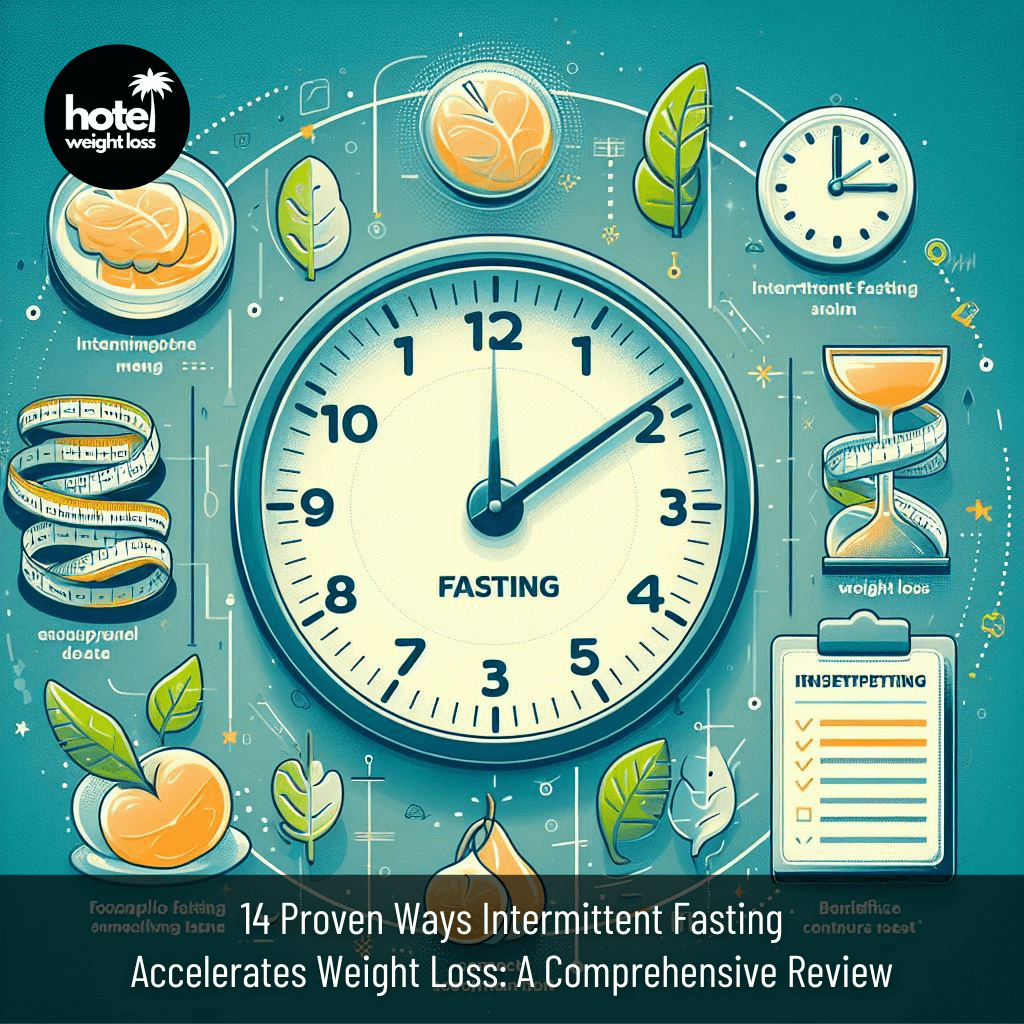Have you ever pondered the idea of unlocking the key to weight loss while lounging in the plush comfort of a hotel room? Picture this: the serene ambience, the crisp linens, and the aroma of freshly brewed coffee wafting through the air. Imagine complementing this luxurious setting with a transformative weight loss journey courtesy of intermittent fasting.
In the fast-paced world of today, when time feels like the greatest commodity, intermittent fasting (weight loss) appears to be a ray of hope for people who are trying to lose weight. However, what is intermittent fasting (weight loss) exactly, and how can it help me lose a lot of weight? Take a deep dive into “Intermittent fasting and weight loss: Systematic review” with Stephanie Welton, Robert Minty, Teresa O’Driscoll, Hannah Willms, Denise Poirier, Sharen Madden, and Len Kelly. We guarantee an engaging exploration.
Key Takeaways
Let’s explore some of the most important conclusions from our systematic research before getting into the specifics of intermittent fasting:
- By utilising the principle of deliberate meal timing, intermittent fasting (weight loss) offers a methodical approach to weight loss.
- People can speed weight loss by using their body’s natural fat-burning capabilities by alternating between eating and fasting times.
- Our analysis provides a path for optimising intermittent fasting (weight loss) for optimum performance by highlighting 14 evidence-based tactics from thorough scientific research.
The Science Behind Intermittent Fasting (Weight Loss)
Understanding the Mechanisms of Intermittent Fasting
Intermittent fasting (weight loss) operates on a simple yet profound principle: manipulating the timing of meals to induce metabolic adaptations conducive to weight loss. Within the confines of a fasting window, the body undergoes a cascade of physiological changes, priming it for enhanced fat utilisation. By depleting glycogen stores and mobilising fatty acids, intermittent fasting (weight loss) prompts the transition from glucose to fat as the primary fuel source, facilitating sustained weight loss.
Hormonal Regulation and Weight Management
Its profound impact on hormonal regulation is central to the success of intermittent fasting (weight loss). Fasting triggers a surge in catecholamines and growth hormones, orchestrating a metabolic symphony geared towards fat mobilisation and preservation of lean muscle mass. Additionally, intermittent fasting (weight loss) modulates insulin sensitivity, mitigating insulin resistance and fostering improved metabolic health—a pivotal component of sustainable weight management.
Autophagy: Cleansing the Cellular Landscape
Beyond its role in weight loss, intermittent fasting (weight loss) unveils a hidden gem within cellular rejuvenation: autophagy. This cellular recycling process orchestrates the degradation and clearance of damaged organelles and proteins, purifying the cellular landscape and promoting longevity. By harnessing the power of autophagy, intermittent fasting not only aids in weight loss but also confers many health benefits, ranging from enhanced cognitive function to bolstered immune resilience.
Psychological Resilience and Behavioral Adaptations
In weight loss, the battle extends far beyond the confines of physical exertion—it encompasses a psychological odyssey fraught with challenges and triumphs. Intermittent fasting (weight loss) reshapes our relationship with food and instils discipline and mindfulness. By fostering psychological resilience and fortitude, intermittent fasting equips individuals with the tools necessary to navigate the complexities of dietary adherence, paving the way for sustainable weight loss success.
Sustainable Lifestyle Integration
One of the hallmark features of intermittent fasting (weight loss) lies in its adaptability and flexibility, rendering it a sustainable dietary approach amidst the rigours of modern-day living. Unlike conventional dieting paradigms fraught with deprivation and restriction, intermittent fasting offers a liberating framework that seamlessly integrates into diverse lifestyles. Whether a jet-setting executive or a globetrotting adventurer, intermittent fasting empowers you to reclaim control over your dietary destiny, irrespective of your surroundings.
Facts and Figures
Find below a table from the original journal articles that shows the outcome of risk factors of diabetes and heart disease for 22 intermittent diets in adults without T2DM.
Credit: https://www.ncbi.nlm.nih.gov/pmc/articles/PMC7021351/table/t2-0660117/?report=objectonly
Find below a table from the original journal articles that shows the outcome of risk factors of diabetes and heart disease for 5 intermittent diets in adults with T2DM.
Credit: https://www.ncbi.nlm.nih.gov/pmc/articles/PMC7021351/table/t3-0660117/?report=objectonly
Conclusion
As we draw the curtains on our exploration of intermittent fasting (weight loss) and its profound implications for weight loss, one thing becomes abundantly clear: the journey towards optimal health and wellness transcends mere physical transformation—it embodies a holistic fusion of mind, body, and spirit. Armed with the insights gleaned from our systematic review, you possess the knowledge and agency to embark on a transformative odyssey towards lasting vitality.
FAQs
-
What is intermittent fasting (weight loss), and how does it promote weight loss?
Intermittent fasting entails alternating between periods of eating and fasting, harnessing strategic meal timing to induce metabolic adaptations conducive to weight loss. By depleting glycogen stores and promoting fat utilisation, intermittent fasting facilitates accelerated fat loss.
-
Does intermittent fasting have any adverse effects on metabolic health?
Contrary to popular misconceptions, intermittent fasting has been shown to enhance metabolic health by improving insulin sensitivity and modulating hormone levels. When implemented correctly, intermittent fasting can confer many health benefits beyond weight loss, including enhanced cognitive function and longevity.
-
How can I incorporate intermittent fasting into my lifestyle, especially while travelling?
Intermittent fasting offers unparalleled flexibility and adaptability, making it an ideal dietary approach for individuals with dynamic lifestyles. Whether travelling for business or leisure, you can seamlessly integrate intermittent fasting by adjusting your eating window to accommodate your schedule and preferences.
-
Is intermittent fasting suitable for individuals with pre-existing medical conditions?
Before embarking on any dietary regimen, it’s crucial to consult with a healthcare professional, especially if you have pre-existing medical conditions. While intermittent fasting is generally well-tolerated, certain medical conditions may warrant modifications or supervision to ensure safety and efficacy.
-
Can intermittent fasting be combined with other dietary approaches, such as the ketogenic diet?
Absolutely! Intermittent fasting can synergise with various dietary protocols, including the ketogenic diet, to amplify weight loss and metabolic benefits. By coupling intermittent fasting with the ketogenic diet, individuals can unlock a potent metabolic synergy that accelerates fat loss and enhances overall well-being.
-
How long does it take to see results with intermittent fasting?
The timeline for experiencing results with intermittent fasting can vary depending on factors such as metabolic rate, dietary adherence, and physical activity levels. While some individuals may notice significant changes within a few weeks, others may require more time to observe tangible results. Patience, consistency, and adherence to a balanced dietary approach are crucial to maximising the efficacy of intermittent fasting.
-
Are there any specific foods or beverages to consume during the fasting period?
During fasting, it’s advisable to abstain from calorie-containing foods and beverages to preserve the metabolic benefits of fasting. Opt for non-caloric drinks such as water, herbal tea, or black coffee to curb hunger and promote satiety without compromising the fasting state.
-
How can intermittent fasting support long-term weight maintenance?
Unlike conventional dieting paradigms characterised by unsustainable restrictions and deprivation, intermittent fasting offers a sustainable approach to weight maintenance. By fostering metabolic flexibility, psychological resilience, and behavioural adaptations, intermittent fasting empowers individuals to sustain their weight loss success and cultivate lifelong habits conducive to optimal health.
-
Can intermittent fasting be customised to accommodate individual preferences and goals?
Absolutely! Intermittent fasting is highly customisable, allowing individuals to tailor their fasting protocols to align with their preferences, goals, and lifestyle constraints. Whether you prefer a time-restricted eating window or alternate-day fasting, many approaches suit your unique needs and aspirations.
-
How can Hotel Weight Loss assist me in integrating intermittent fasting into my weight loss journey?
Hotel Weight Loss specialises in providing personalised guidance and support to individuals seeking to optimise their health and wellness through innovative dietary strategies, including intermittent fasting. Our experienced health specialists will work closely with you to develop a customised intermittent fasting protocol tailored to your unique goals, preferences, and lifestyle, ensuring seamless integration into your weight loss journey. Contact us today for a transformative odyssey towards lasting vitality and well-being.
Ready to embark on your weight loss journey? Contact Hotel Weight Loss today to unlock the transformative potential of intermittent fasting and embark on a personalised roadmap to wellness.
Also, see Conquer Any City: 5 Personalized Fitness Plans for Travelers (Who Hate Holding Back!)
References
Welton S, Minty R, O’Driscoll T, Willms H, Poirier D, Madden S, Kelly L. Intermittent fasting and weight loss: Systematic review. Can Fam Physician. 2020 Feb;66(2):117-125. PMID: 32060194; PMCID: PMC7021351. Retrieved from: https://www.ncbi.nlm.nih.gov/pmc/articles/PMC7021351/
1. Statistics Canada . Overweight and obese adults, 2018. Ottawa, ON: Government of Canada; 2018. Available from: https://www150.statcan.gc.ca/n1/pub/82-625-x/2019001/article/00005-eng.htm. Accessed 2019 Jul 1. [Google Scholar]
2. Pi-Sunyer FX. Comorbidities of overweight and obesity: current evidence and research issues. Med Sci Sports Exerc. 1999;31(11 Suppl):S602–8. [PubMed] [Google Scholar]
3. Guh DP, Zhang W, Bansback N, Amarsi Z, Birmingham CL, Anis AH. The incidence of comorbidities related to obesity and overweight: a systematic review and meta-analysis. BMC Public Health. 2009;9:88. [PMC free article] [PubMed] [Google Scholar]
4. Howard BV, Manson JE, Stefanick ML, Beresford SA, Frank G, Jones B, et al. Low-fat dietary pattern and weight change over 7 years: the Women’s Health Initiative Dietary Modification Trial. JAMA. 2006;295(1):39–49. [PubMed] [Google Scholar]




